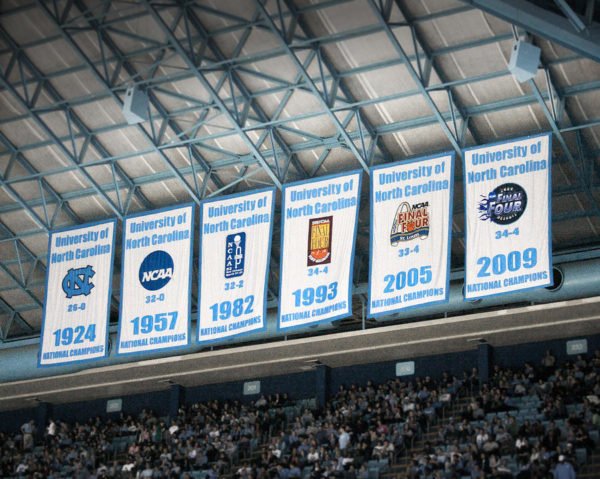ACC Offseason Storylines: UNC Escapes Punishment in Academic Scandal
Posted by Brad Jenkins on October 18th, 2017We are now a little over three weeks away from opening night in college basketball, so it’s time to start our preseason coverage here at the ACC microsite. Over the next several weeks we will preview the fortunes of all 15 ACC schools by projecting how each squad will maximize its strengths and mitigate its weaknesses, and we will also be reporting from ACC Operation Basketball in Charlotte later this month. But first, let’s catch up on a few of the most important storylines in the ACC since North Carolina captured its sixth NCAA Championship in Glendale last April. Here’s Part Two of our three-part series (Part One is here).
NCAA Taps Out in Case vs. North Carolina

After years of speculation, it appears that all these Championship Banners (+1) will remain aloft in the Dean Smith Center. (OrangeCatArt)
After years of delays from myriad stall tactics, lawyer threats and public posturing, North Carolina received the NCAA’s final report last Friday concerning the school’s decades-long academic scandal. At the heart of the case was the NCAA’s original contention that athletes received special access to bogus classes, an impermissible benefit. The university countered with the argument that the NCAA was in violation of its own bylaws by delving into the academic side of things. In the end, despite clear evidence that North Carolina athletes received disproportionate benefit in staying eligible through the ‘paper class’ coursework, the NCAA took the safest route and backed off, stating:
“The panel noted that its ability to determine whether academic fraud occurred at UNC was limited by the NCAA principle relying on individual member schools to determine whether academic fraud occurred on their own campuses. North Carolina said the work was assigned.”
It is likely that the NCAA felt this way all along. They knew that faculty members at North Carolina had developed a bogus system that benefited the school’s athletes in the major sports – the Wainstein Report was clear on the matter. But, the NCAA can also only make decisions based on what a school reports to them — not what was revealed in other investigations. Once North Carolina took the stance that the classes were easy but legitimate (although prior publicly available evidence contradicts that notion), it could exploit a gaping loophole in the NCAA’s case. And still, the NCAA persisted in its investigation for three interminable years, probably because the embattled organization was under great pressure from its membership and the public to go after a high-profile program. Outcry against the NCAA was swift and certain, with most of the college basketball world seeing this result as a blue-blood program ‘getting away with it.’ Critics will have to be satisfied with the public humiliation (and $18 million in legal fees spent) that the university has already endured — effectively redefining what is meant by “The Carolina Way.”
Maybe this outcome, along with the ongoing FBI probe, will produce a silver lining. Eventually the outdated college athletics model will reach a breaking point, and perhaps events like these will serve to further push things in that direction. The huge amount of money involved in college athletics simply does not mesh with the notion of amateur sports. Those billions of dollars have created a bastardized system of “Beer and Circus” where athletics outweigh academics at most Power 5 universities. It’s sounds cliche but it’s also true — if such a thing can happen at a school like North Carolina, it can happen at any big public university.










































